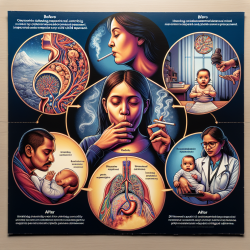Introduction
In the field of child development and education, understanding the factors that influence a child's academic performance is crucial. A recent study titled "The Role of Maternal Smoking in Effect of Fetal Growth Restriction on Poor Scholastic Achievement in Elementary School" provides valuable insights into how maternal smoking and fetal growth restriction can impact a child's scholastic achievement. This blog aims to help practitioners apply these findings to improve outcomes for children.
The Study at a Glance
The research conducted in Nova Scotia, Canada, involved a cross-sectional survey of 3,739 students. It linked perinatal data, parental interviews, and standardized test performance data to assess the impact of maternal smoking and fetal growth restriction on academic achievement. The study found that children born small-for-gestational-age (SGA) to mothers who smoked had a significantly higher risk (29.4%) of poor test results compared to other groups.
Key Findings
- Maternal smoking during pregnancy is a significant risk factor for poor scholastic achievement in children, particularly when combined with fetal growth restriction.
- Children born SGA to mothers who smoked had an adjusted odds ratio of 1.46 for poor academic performance, highlighting the compounded risk.
- The study emphasizes the importance of considering both intrinsic and extrinsic factors affecting fetal growth when assessing child development outcomes.
Implications for Practitioners
Practitioners in the field of speech language pathology and child development can use these findings to enhance their practice. Here are some actionable steps:
- Early Intervention: Identify children at risk due to maternal smoking and fetal growth restriction early on. Implement targeted interventions to support their cognitive and academic development.
- Parental Education: Educate expectant mothers about the risks of smoking during pregnancy and provide resources to help them quit.
- Collaboration with Schools: Work closely with educators to monitor the academic progress of children identified as at risk and develop individualized support plans.
- Further Research: Encourage ongoing research to explore the long-term impacts of maternal smoking and fetal growth restriction on child development.
Conclusion
The study underscores the critical role of maternal health behaviors in shaping a child's academic trajectory. By integrating these findings into practice, practitioners can better support children in reaching their full potential. For those interested in delving deeper into the research, the original study provides a comprehensive analysis of the data and findings.
To read the original research paper, please follow this link: The Role of Maternal Smoking in Effect of Fetal Growth Restriction on Poor Scholastic Achievement in Elementary School.










